Key takeaways:
- Effective music band promotion requires building genuine relationships with fans through two-way communication and interactive engagement.
- Live performances are essential for establishing authenticity and brand identity, providing immediate feedback and memorable connections with the audience.
- Analyzing performance failures and seeking constructive feedback can enhance growth, pushing bands to embrace humility and resilience.
- Preparation for gigs should include contingency plans and fostering collaboration among band members, allowing for adaptability in challenging situations.
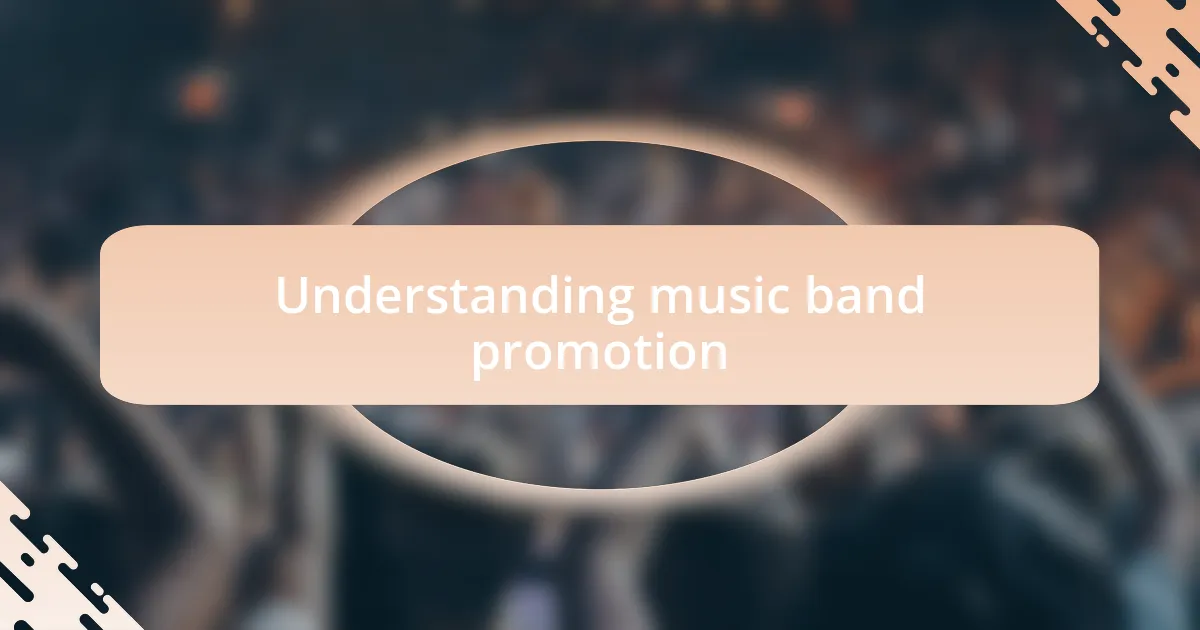
Understanding music band promotion
Understanding music band promotion is crucial for any aspiring artist. I remember the first time my band launched a single. We thought that simply sharing it on social media would be enough. It wasn’t. I felt a mix of frustration and confusion when we saw minimal engagement, raising the question: what did we miss?
Promotion is not just about getting your music out there; it’s about telling your story in a way that resonates. I learned that building relationships with fans can take time and effort. One of our best moments came when I responded to comments on our post, creating real connections that made our listeners feel valued. This taught me the power of two-way communication in engaging audiences.
As I look back, I realize that effective promotion requires strategy and creativity. Band promotions can often feel overwhelming, but I’ve realized that breaking down tasks into manageable steps helps. For instance, planning a small local gig not only built our confidence but also served as a superb way to connect with the community. How can you make your promotion efforts more personal and interactive? That’s a question worth exploring as you develop your approach.
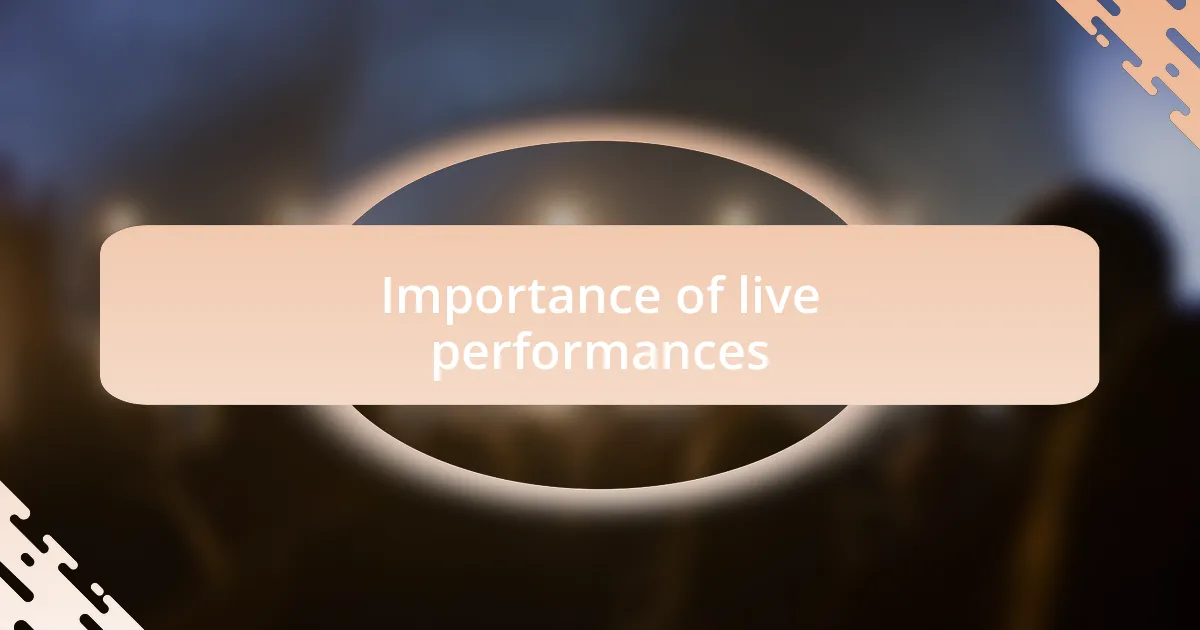
Importance of live performances
Live performances are vital in establishing a band’s presence and authenticity. I vividly remember the adrenaline rush of our first gig; I could feel the audience’s energy feeding off our performance. That connection is something you simply can’t replicate through recorded music. Have you ever felt the thrill of playing live? There’s a magic in those moments that deepens the bond between the band and its fans.
When we took the stage, I noticed how the crowd responded to our emotions, and it reminded me that live performances provide immediate feedback. It was during that first performance that I learned how to read the room and shift our energy accordingly. It’s astonishing to see how a simple change in our setlist in response to audience reactions can create a memorable experience. Isn’t it fascinating how music can transform a moment?
Moreover, live shows serve as a powerful promotional tool. They not only showcase our music but also help develop our branding. I recall meeting fans after the show who shared their personal stories and how our songs resonated with them. That’s when I realized that these performances are significant milestones in our journey, allowing us to leave a lasting impression in the hearts of those who listen. How does your band create memorable experiences during live performances?
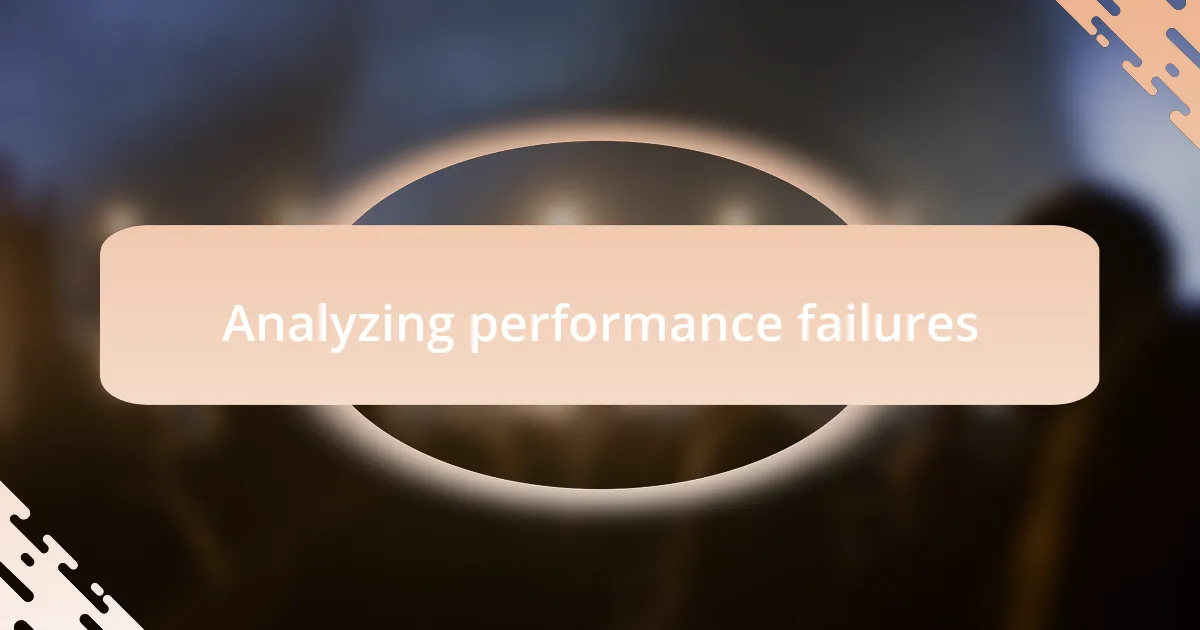
Analyzing performance failures
Analyzing performance failures is a crucial step in a band’s growth. I recall a specific gig where, despite our enthusiasm, everything seemed to spiral out of control. The sound system malfunctioned, and it felt like our energy vanished into thin air. In those moments, I realized that identifying what went wrong is just as important as celebrating the successes.
Reflecting on that experience, I remember feeling a mixture of embarrassment and frustration. I had to confront the fact that not every performance would be perfect, and that’s okay. I learned to view these failures as opportunities for improvement, to dissect what didn’t resonate with the audience or what technical issues we faced. Have you ever found yourself in a similar situation and learned something unexpected from it?
As I analyzed that failure, it became clear that humility and patience are essential in this industry. It pushes you to find solutions rather than dwell on mistakes. I started asking for feedback from team members and the audience alike, which provided a new perspective. Engaging with constructive criticism not only strengthened my resilience but also fostered a deeper connection with my bandmates. How might embracing failure lead you to unexpected insights?
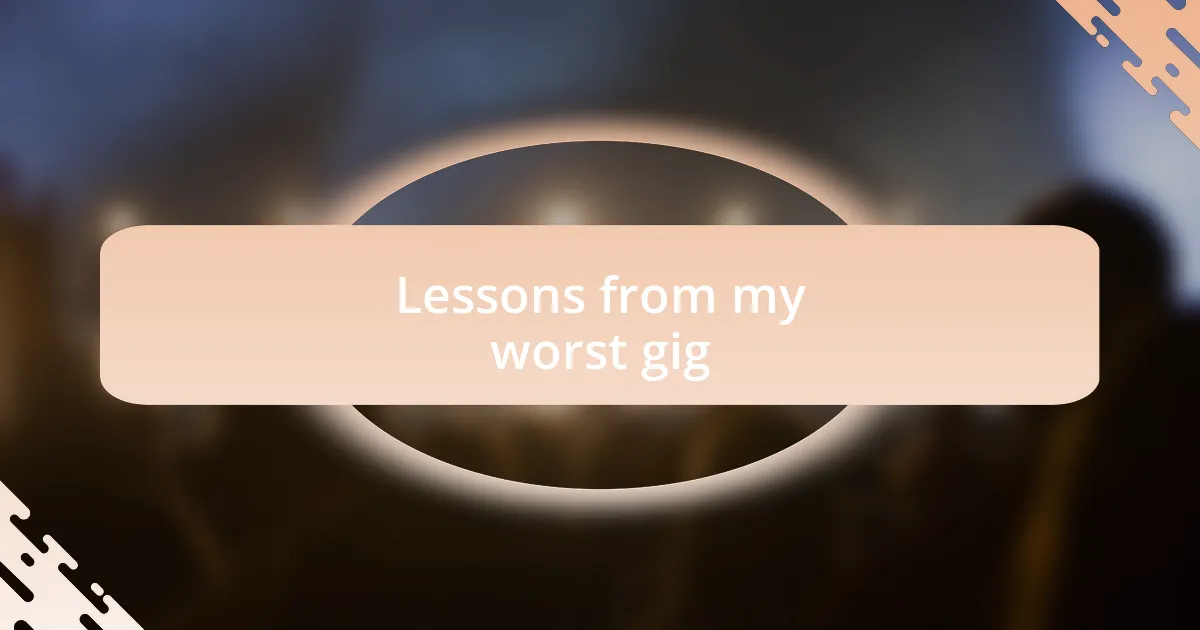
Lessons from my worst gig
During that disastrous gig, I vividly remember how the unresponsive crowd felt like a heavy weight on my chest. It struck me that as performers, we can easily become absorbed in our own world, forgetting that our primary goal is to connect with the audience. I learned that tuning into their energy and feedback, even in the chaos, can transform a difficult moment into an engaging experience. How often do we overlook the importance of reading the room?
I discovered that preparation extends far beyond mastering our songs; it includes having a solid backup plan for technical failures. When our sound system crashed, we were unprepared and it cost us dearly. This experience taught me to prioritize rehearsing not just our set but also contingency plans, so when things go awry, we can still deliver a memorable performance. Do you have a backup strategy when things don’t go as planned?
Lastly, I realized the power of vulnerability in my interactions with the audience. Sharing our struggles, even if it’s admitting to a rough performance, often earns more respect than a flawless façade. After the gig, I took a moment to connect with some audience members, and surprisingly, they appreciated our honesty. This relationship-building approach turned my worst gig into a lesson in authenticity. How might your own experiences resonate more deeply with fans if you allow them to see your genuine self?
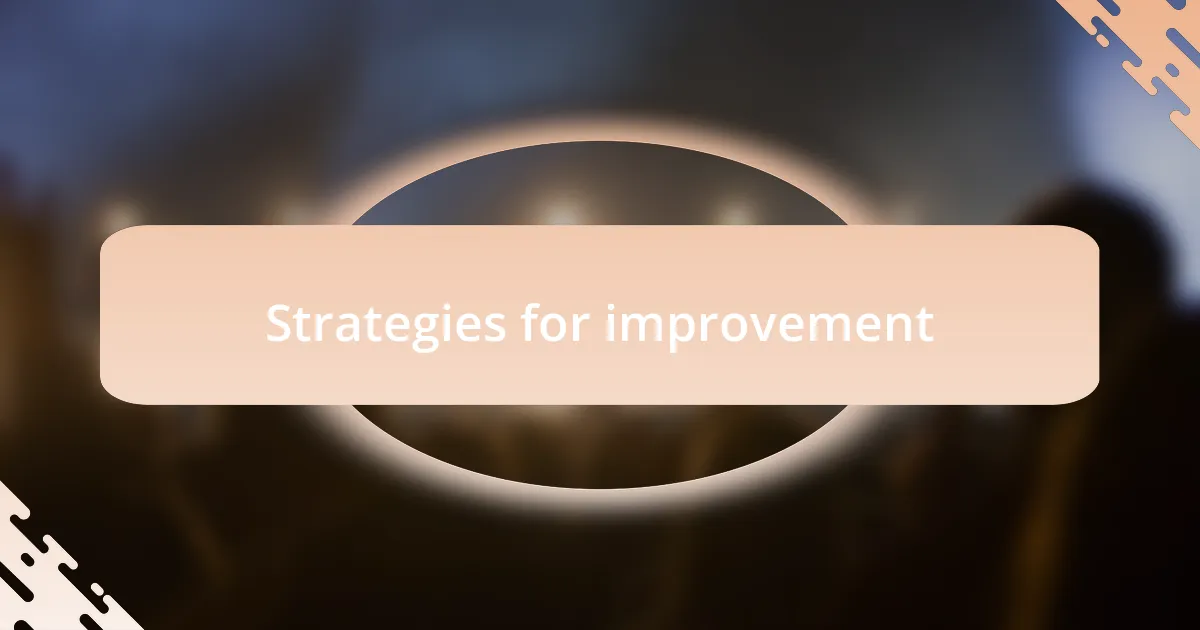
Strategies for improvement
When I think about improving following a tough performance, I can’t stress enough the importance of gathering feedback. After that gig, I reached out to friends and fellow musicians who saw the show. They offered perspectives I hadn’t considered, pointing out both my strengths and areas that needed work. Have you considered the value of outside opinions in your growth process?
Another approach that worked wonders for me was focusing on self-reflection after each performance. I took time to journal my thoughts, analyzing what went well and what didn’t. This practice allowed me to track my progress and identify recurring themes in my performances. How often do you sit down with your thoughts to assess your journey?
Lastly, I began experimenting with different audience engagement techniques to make the performance more interactive. For instance, during my next show, I involved the crowd by sharing fun stories about my band and even asking them to sing along with our biggest hits. It was a game-changer! Have you thought about how increasing audience participation can shift the energy in the room? This simple shift not only boosted my confidence but also made the experience memorable for everyone involved.
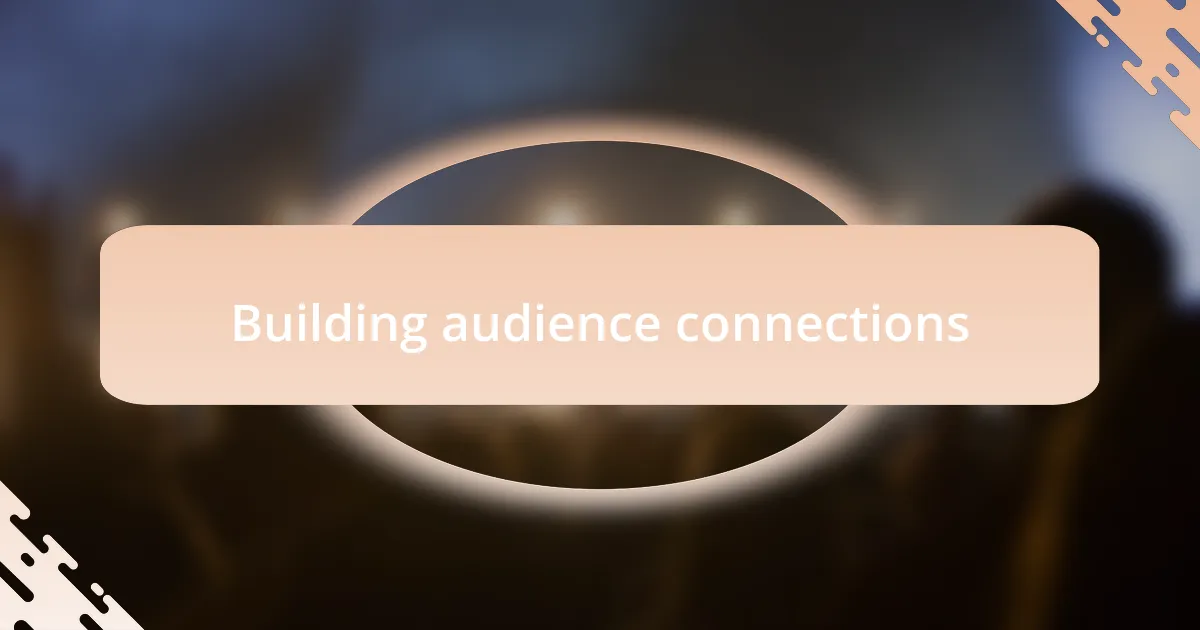
Building audience connections
Connecting with an audience goes beyond just playing music; it’s about forming genuine relationships. I remember one intimate gig where I shared a personal story about how one of our songs was inspired by a tough experience in my life. The reaction was electric—people applauded loudly and even approached me afterward to share their own stories. This showed me how vulnerability can create a bond that transcends the stage.
Engagement is a two-way street. While performing at a festival, I noticed that when I looked someone in the eye and smiled, it drew them in. I began to interact more, asking the crowd questions and seeing hands shoot up in response. Have you ever felt that magical moment when an audience truly connects with you? It’s a moment of shared energy that makes everything worth it.
Social media also plays a crucial role in this connection-building process. After posting a behind-the-scenes video from a rehearsal, I received messages from fans expressing how they felt more included in our journey. This taught me that sharing snippets of our world can foster a supportive community. Have you explored how your online presence can enhance relationships with your audience? It’s a powerful tool that keeps the connection alive, even offstage.
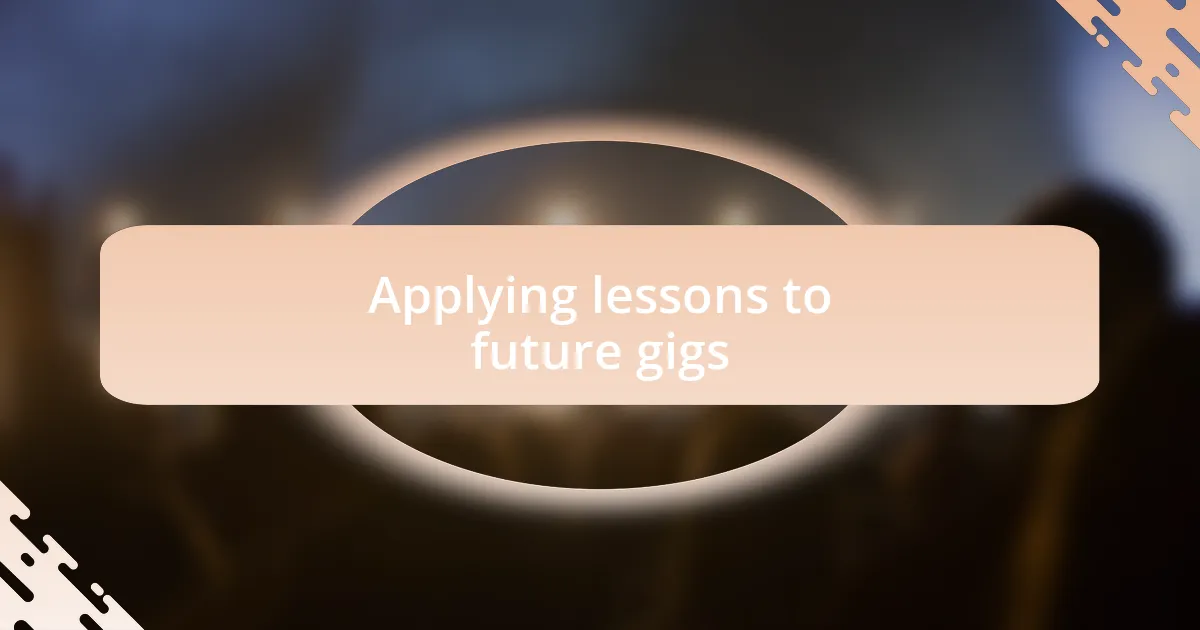
Applying lessons to future gigs
Applying lessons to future gigs
Reflecting on my worst performance taught me the importance of preparation and adaptability. There was a time when technical issues derailed our set, and instead of panicking, I realized that being flexible can be a game-changer. How would I react in a similar situation now? I would likely use humor to engage the audience while the crew resolved the issues, turning an awkward moment into a shared experience.
After that experience, I made a conscious effort to rehearse more for our future gigs, incorporating not just the songs but also potential troubleshooting scenarios. I remember during a later show, a power outage forced us to play acoustically in the dark. Instead of losing momentum, it created an intimate atmosphere that the audience loved. Have you thought about how unexpected challenges can lead to moments of connection? Embracing these opportunities has transformed my performances into more dynamic and memorable occurrences.
Collaboration with my band members has also evolved from my past mistakes. I used to think I could control every aspect of our performance, but I’ve learned that trust and teamwork are vital for success. I now actively seek input during rehearsals, allowing everyone to share their ideas. This collective approach has not only strengthened our bond but also improved our overall sound. How has teamwork shaped your own music journey? Understanding the value of every member’s voice has enriched my perspective on collaboration.